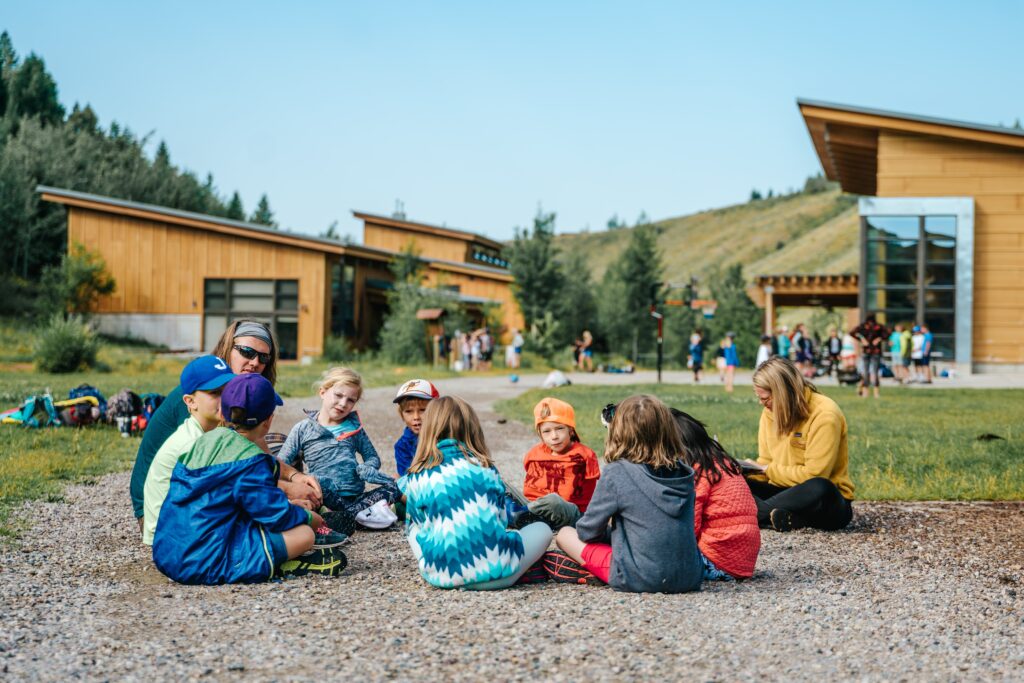It was only a week ago that over a hundred educators and I sat together in a room, stifling giggles as we digitally soared over hot springs, slid down snow-covered mountain peaks, and skydove over a supervolcano. We were whisked away to a place where we found erupting geysers, rivers, and other natural features we’re all too familiar with here in the Greater Yellowstone Ecosystem (GYE). But it wasn’t the GYE; it was nowhere near the GYE. In fact, this place we were taken to doesn’t even exist in the real world. So, where was it?
Well, it was a fantasy island. And it’s the place where the online video game, Fortnite, takes place. Fortnite, for those who aren’t familiar, is a multi-player online phenomenon that took the world by storm in 2017. But what’s special about it is that it’s not just a game, it’s a place. A place where 250 million people visit a year (Yellowstone only brings about 4 millions a year for comparison), a place where you can do pretty much do anything you want, a place to connect with friends, a community, a third place. It’s also a place, we were learning, where we could implement place-based education. Because, if 75 million people are visiting Fantasy Island each month, chances are some of our students are going, or have been. And connecting topics we’re teaching about to places our students are familiar with is place-based education.
 Many of us sitting in the audience were enlightened by this newfound connection. So, where were we? At Teton Science Schools’ Place-Based Education Symposium in Jackson, WY.
Many of us sitting in the audience were enlightened by this newfound connection. So, where were we? At Teton Science Schools’ Place-Based Education Symposium in Jackson, WY.
Launched in the spring of 2016 as a way to celebrate the place-based work happening across the organization, the Place-Based Symposium now occurs annually with the purpose of bringing TSS staff, AmeriCorps, students, and regional community members together to share and discuss best practices in local learning and global citizenship. This year, the Symposium welcomed 24 presenters from throughout the organization and local community, each of whom shared their wisdom through presentation, round-table discussions or Pecha Kucha.
In the presentation category, presenters spoke on topics as they related to three topics: culturally relevant & socio-emotional pedagogy, place-based education, data & science and place-based education in practice. In the span of an hour, we were introduced to the idea of “white science” and practices for instruction in a culturally relevant manner; we were immersed in mindfulness exercises that our independent school teachers use to help their students self-regulate; we were asked questions like “how do we measure our impact?”and; shown how to implement a place-based unit that addresses each of our six foundational design principles.
At the round-table discussions, attendees had an opportunity to dive deep with presenters, as well as each other, and create powerful dialogue on subjects like environmental stewardship, branding and communication and diversity, equity and inclusion.
And finally through a series of Pecha Kucha style presentations (where presenters are asked to deliver their story in 5 minutes through 15 slides), we watched our first-ever virtual presenter take us on a journey of place-based education in Virginia; we explored the importance of campfires as a space for human connection, storytelling, and reflection; we uncovered important patterns in teaching and learning through a study on questions; we learned the benefits of a tech-free education from an ex-technology teacher; and, of course, dove into digital place as we explored Fortnite’s Fantasy Island.
After two hours at the Symposium, I felt that I had a pretty good grasp of the importance and impact of the Symposium. That was until dinner, when we had the pleasure of listening to Rosie Read, one of Wyoming’s only immigration attorneys. Rosie gave her keynote presentation on the state of immigration in Jackson Hole. Now, I’ve sat through my fair share of keynotes and I have to say, Rosie is the only keynote speaker I’ve seen ever hold the attention of so many people; not one pair of eyes strayed from her presence on stage. She humbly and eloquently weaved her experience and expertise in immigration into the stories of the place-based education world — it was the perfect way to wrap the night.
At the end of the event, I asked Leslie Cook (one of the Symposium’s many organizers) what kind of impact she hoped the Symposium had on all of who attended and she told me this:
“We hope that attendees of the Symposium leave inspired and with a more solid understanding of what place-based education is and how it is being practiced across our region and within Teton Science Schools.”
In my mind, that’s exactly what it did.


